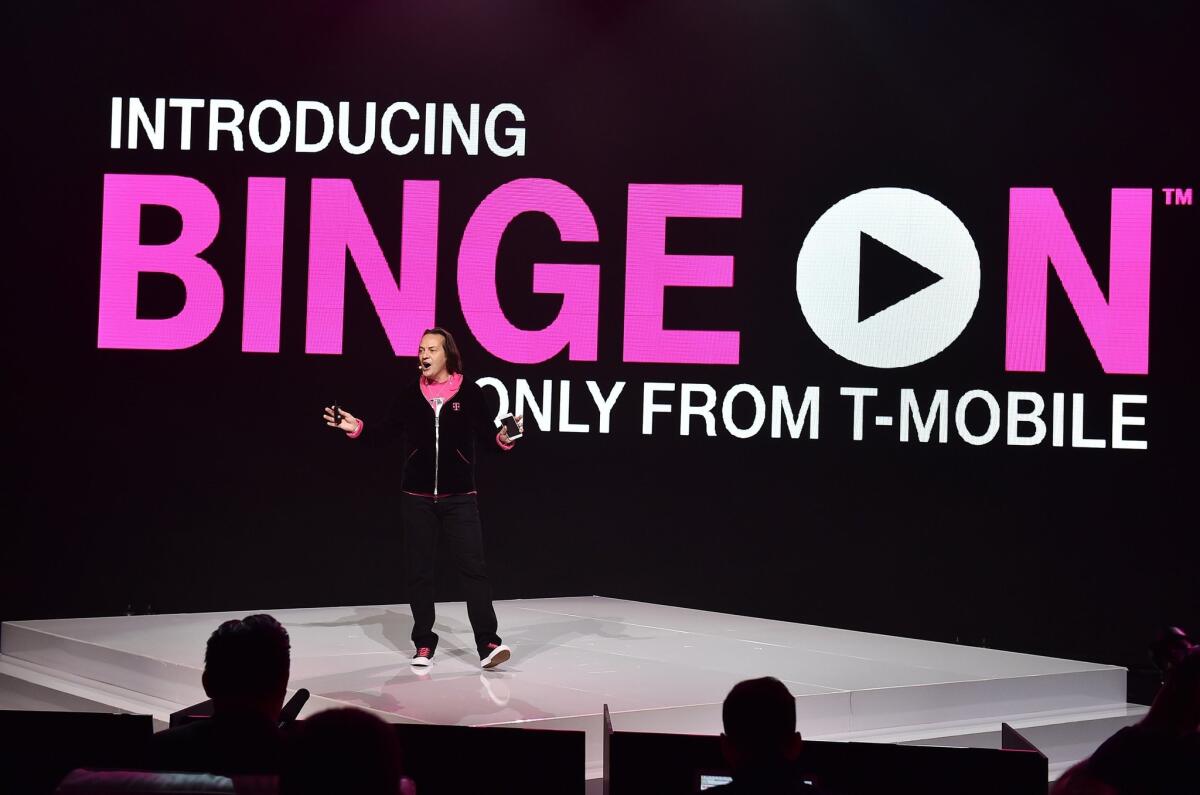Opinion: T-Mobile’s unlimited video streaming is not a net neutrality problem

T-Mobile CEO John Legere introduces Binge On during a press conference at the Shrine Auditorium on Tuesday. Binge On allows T-Mobile customers to stream video for free without counting against their monthly data allowance.
- Share via
T-Mobile Chief Executive John Legere sure knows how to make net neutrality advocates look unreasonable.
This week, Legere unveiled T-Mobile’s latest effort to lure customers: The company will no longer count streaming video from Netflix, Hulu and multiple other online services against users’ data caps. Appropriately named Binge On, the feature will be particularly attractive to younger and lower-income users who can’t afford a large monthly data plan.
What’s not to like? Well, some advocates of strong federal net neutrality regulations argue that this kind of exemption -- called “zero rating” -- violates the spirit and possibly the letter of the Federal Communications Commission’s new rules because it enables the Internet service provider (T-Mobile) to pick winners and losers among content providers. In a truly neutral Internet, such decisions are left entirely to consumers.
John Bergmayer of Public Knowledge, a tech advocacy group, put it this way in a statement: “Under [T-Mobile’s] current model, customers might choose to use a service simply because it doesn’t count toward their data plans, rather on its merits. Turning the mobile Internet into a carrier-controlled walled garden is ultimately a bad idea for consumers, for all online services (even those included in T-Mobile’s zero-rating today), and for the wireless industry as a whole.”
Public Knowledge had similar complaints last year when T-Mobile launched its Music Freedom initiative, which exempted streaming music services from the data caps. But I think it’s fundamentally misreading the market and T-Mobile’s motives to think of these initiatives as anticompetitive. And if the FCC interpreted its neutrality rules the way Bergmayer does, it would reduce competition among broadband ISPs, the place where it’s needed the most both for consumers and for the cause of net neutrality.
As anyone who remembers dial-up Internet and the pre-iPhone mobile Web will recall, the public has a profound dislike of walled gardens. Internet users have voted with their wallets repeatedly in favor of open access. That’s why T-Mobile has a strong incentive to include in Binge On any video service that wants to be part of it.
The point here isn’t to differentiate Netflix and other Binge On participants from rivals who aren’t participating. It’s to differentiate T-Mobile from Verizon Wireless, Sprint and AT&T.
But wait, you say: Services that are included in Binge On have a competitive advantage over the ones that aren’t. That’s true, but the same could be said for video services that can afford a content distribution network that makes their streams look better to users, or that can afford to pay Hollywood studios for exclusives and marketing tie-ins.
A neutral Web isn’t necessarily a level playing field; it’s just one that’s not warped by consumers’ ISPs. That means the only obligation on T-Mobile is to make zero-rating opportunities available to every streaming music and video service that wants in. And the company has said it will do so at no charge to those services, which prevents it from running afoul of the FCC rule against ISPs charging content providers for special treatment.
The commission’s neutrality rules don’t say yea or nay to zero rating, leaving the FCC to consider complaints against such services on a case-by-case basis. The standard is a vague one: ISPs cannot unreasonably interfere with or unreasonably disadvantage a content or service provider’s access to consumers, and vice versa.
What T-Mobile is doing with Binge On strikes me as being on the right side of that line. Some argue that the technical requirements -- the streams must be in a particular format -- amount to unreasonable interference, but that’s a stretch. Said technical requirements are the same for all providers, which seems like the definition of neutrality.
For its part, the consumer advocacy group Free Press argued that Binge On shows how unnecessary data caps are. “Data is data,” Policy Director Matt Wood said. “There’s nothing about a gigabyte of Netflix content that makes it more or less of a drain on the carrier’s network than a gigabyte of some other data.... [T]he real question is why T-Mobile would discriminate in favor of its customers who watch a lot of video, and against those who don’t -- especially when we’ve heard excuses so many times about the supposed strain that video puts on networks.”
It’s worth bearing in mind that streaming video makes up a huge portion of the Internet, particularly in prime time. Anyone who doubts the existence of congestion has somehow managed to avoid the interruptive buffering that plagues so many online viewers. Isn’t it possible that one of T-Mobile’s motives here is to move video streams to a lower data rate (Binge On is sub-high-definition quality), making it easier for the network to manage the demand for bandwidth?
Besides, there’s nothing in the FCC’s neutrality rules that bars data caps, which enable carriers to segment the market and charge higher prices to those who put a higher value on bandwidth. Binge On represents another reduction in the pain caused by data caps, which seems like an unalloyed good thing for consumers.
Follow Healey’s intermittent Twitter feed: @jcahealey
More to Read
A cure for the common opinion
Get thought-provoking perspectives with our weekly newsletter.
You may occasionally receive promotional content from the Los Angeles Times.







